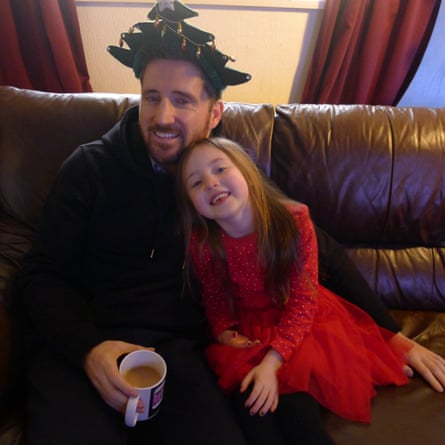I have never missed Christmas at home, though I have lived elsewhere for more than 20 years. This year, I will break that run. The festive travel window means that I could fly back to Northern Ireland from London. But my father is elderly and our neighbourhood on the border has been relatively untouched by Covid-19 until recently, so it doesn’t feel the safest plan. Instead, I’ll be in London. It will mark a year since I’ve been home; the longest I’ve ever been away.
With a flight time of under an hour, on a ticket often cheaper than a night out, I normally go home many times a year. It means I never have to miss a big night out; if it’s an emergency, I can be back in a matter of hours. Being home often feels crucial to my sense of self.
My father and I live strikingly different lives. Patsy left school at 15, and has farmed the land ever since. He won’t hear of retirement, at 81 years old. While he’s never left the country, I’ve travelled plenty. I’ve been to college in Dublin and London. I did not follow my father into farming, choosing instead to dig with the pen, as the poet Seamus Heaney once put it.

Yet my father and I share a sensibility about the world. Even now, if I air something about politics or how life is going, he will have a view that is familiar and grounding. He’ll reassure me that it’s the world that is topsy-turvy, not me; though if it is the other way around, he is also quick to let me know.
This year, we’ve had to do this remotely, but these phone conversations have been sustaining. I’ve been on walks with the new family dog, Percy, on FaceTime. I celebrated my father’s 81st birthday with him on a WhatsApp video call, with a cake and his two grandkids there in person to blow out the candles. I’ve had Zoom calls with my six-year-old niece, Paige, who has shown me TikTok dance routines, and the gaps where her baby teeth had fallen out.
In time, adult teeth have taken root; aside from that, it’s been an uneventful year. There have been no big family occasions, no weddings or – thankfully – wakes. So, I haven’t missed much, in a sense. It’s just that before 2020, I didn’t have to miss anything at all. In the first five years of my niece’s life, I was very present. I held her when she was three days old. When she had sleepovers, I was in charge of watching the bedroom door for monsters. At a production of The Gruffalo, we learned monsters weren’t that scary. The longer this goes on, the more I’ll miss.
Migration is a rite of passage in Ireland and something that has touched every generation since Famine times. The 2008 recession resulted in the most recent wave; the Irish Times has a web page dedicated to “Generation Emigration”. Once, it used to be a one-way ticket out of the country. But recent migrants, especially those living in Europe, have never had to consider being away.
Over the years, I’ve been able to switch between the two places as and when it suited me. Home was settling. London felt free. As long as I keep going back, I’ve always wagered I’ll never split completely.
The current crisis may be abating, but travel could yet be impacted by the recession, and the climate crisis is another factor. How might all this affect émigrés’ ability to keep a foot in two camps? Dr Marc Scully, a lecturer in psychology at Mary Immaculate College, Limerick, who has studied the Irish diaspora in England, says that the ability to fly home at short notice appears crucial to their identity, wellbeing and resilience. FaceTime, he predicts, will be a poor substitute for being there.
This is not just about flying in for the big 40th birthday: when my mother took ill a few years ago, I was back every six to eight weeks. I don’t know if I was much practical use, but she was always delighted to see me walk through the door.

Being home makes me resilient. I grew up gay in a rural, working-class community on the South Armagh border. When I was young, I thought I was so different as to not be of the place. But away from home, I found I didn’t fit in any better. Studying law in Dublin, then working in the media in London, I didn’t meet many people like me. My experience became filtered through the perspectives of people confident in theirs. It changes how you are in the world; makes you less sure of your place in it.
Going home roots me, although there is still plenty that makes me understand why I left – the way religion still has a hold there, or how blunt people can be, especially if you’ve upped and left. As a local bar manager once asked, when I said I’d gone to London to be a journalist, “Haven’t we plenty of newspapers here?” But home still fits better than most places.
These days when I call, my niece says a vague hello under duress from her father, my brother. In truth, we are both tired of talking on the phone. I’m missing out on the small stuff, like the latest from school, or sitting with my father when he eventually downs tools and comes in for his dinner. I worry I will not be there when I’m truly needed. And I sense my own inbetweenness again, that potential to split. All the ties that I’ve done my best to maintain, are beginning to loosen.
My niece still sends me drawings by post, and each time she spells out her name in brightly coloured crayon, it comes more clearly into focus, just as our relationship feels less and less so. As I put the latest artwork on the fridge door, I find myself wondering who will I be to her if we can’t hang out? And I think of my father, who I have become closer to over the years – something we didn’t manage over the phone. There is that saying about making strange – meaning, being reticent with someone you haven’t seen in a long while. It’s usually used of children, but if I don’t go back so frequently, I wonder if we will all make strange with each other? And who will I be, if I can’t be home?
from Lifestyle | The Guardian https://ift.tt/3gDJu5R
via IFTTT

comment 0 Comment
more_vert